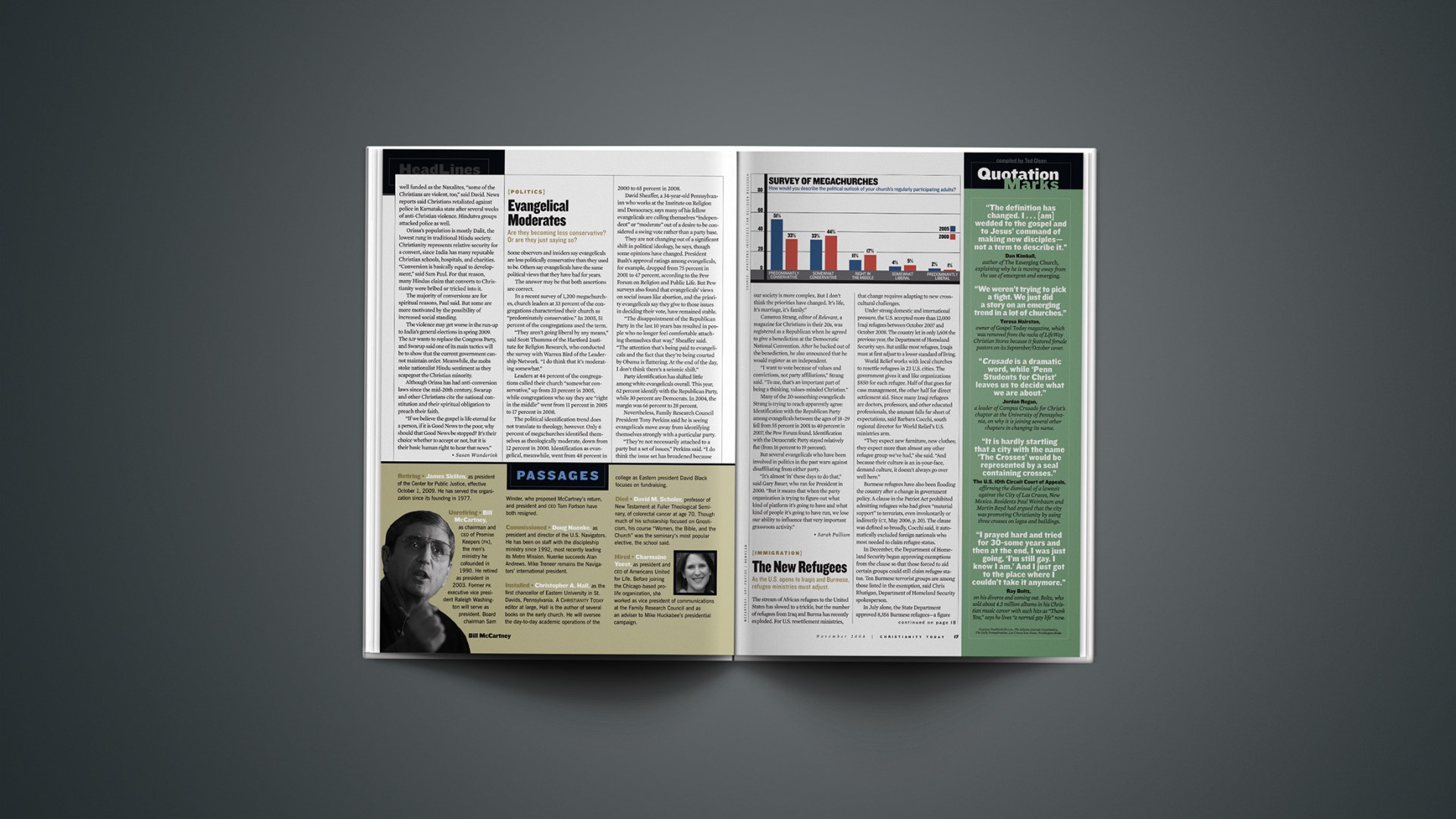Some observers and insiders say evangelicals are less politically conservative than they used to be. Others say evangelicals have the same political views that they have had for years.
The answer may be that both assertions are correct.
In a recent survey of 1,200 megachurches, church leaders at 33 percent of the congregations characterized their church as “predominately conservative.” In 2005, 51 percent of the congregations used the term.
“They aren’t going liberal by any means,” said Scott Thumma of the Hartford Institute for Religion Research, who conducted the survey with Warren Bird of the Leadership Network. “I do think that it’s moderating somewhat.”
Leaders at 44 percent of the congregations called their church “somewhat conservative,” up from 33 percent in 2005, while congregations who say they are “right in the middle” went from 11 percent in 2005 to 17 percent in 2008.
The political identification trend does not translate to theology, however. Only 6 percent of megachurches identified themselves as theologically moderate, down from 12 percent in 2000. Identification as evangelical, meanwhile, went from 48 percent in 2000 to 65 percent in 2008.
David Sheaffer, a 34-year-old Pennsylvanian who works at the Institute on Religion and Democracy, says many of his fellow evangelicals are calling themselves “independent” or “moderate” out of a desire to be considered a swing vote rather than a party base.
They are not changing out of a significant shift in political ideology, he says, though some opinions have changed. President Bush’s approval ratings among evangelicals, for example, dropped from 75 percent in 2001 to 47 percent, according to the Pew Forum on Religion and Public Life. But Pew surveys also found that evangelicals’ views on social issues like abortion, and the priority evangelicals say they give to those issues in deciding their vote, have remained stable.
“The disappointment of the Republican Party in the last 10 years has resulted in people who no longer feel comfortable attaching themselves that way,” Sheaffer said. “The attention that’s being paid to evangelicals and the fact that they’re being courted by Obama is flattering. At the end of the day, I don’t think there’s a seismic shift.”
Party identification has shifted little among white evangelicals overall. This year, 62 percent identify with the Republican Party, while 30 percent are Democrats. In 2004, the margin was 66 percent to 28 percent.
Nevertheless, Family Research Council President Tony Perkins said he is seeing evangelicals move away from identifying themselves strongly with a particular party.
“They’re not necessarily attached to a party but a set of issues,” Perkins said. “I do think the issue set has broadened because our society is more complex. But I don’t think the priorities have changed. It’s life, it’s marriage, it’s family.”
Cameron Strang, editor of Relevant, a magazine for Christians in their 20s, was registered as a Republican when he agreed to give a benediction at the Democratic National Convention. After he backed out of the benediction, he also announced that he would register as an independent.
“I want to vote because of values and convictions, not party affiliations,” Strang said. “To me, that’s an important part of being a thinking, values-minded Christian.”
Many of the 20-something evangelicals Strang is trying to reach apparently agree: Identification with the Republican Party among evangelicals between the ages of 18-29 fell from 55 percent in 2001 to 40 percent in 2007, the Pew Forum found. Identification with the Democratic Party stayed relatively flat (from 16 percent to 19 percent).
But several evangelicals who have been involved in politics in the past warn against disaffiliating from either party.
“It’s almost ‘in’ these days to do that,” said Gary Bauer, who ran for President in 2000. “But it means that when the party organization is trying to figure out what kind of platform it’s going to have and what kind of people it’s going to have run, we lose our ability to influence that very important grassroots activity.”
Copyright © 2008 Christianity Today. Click for reprint information.
Related Elsewhere:
See Christianity Today‘s politics blog for daily election coverage.
Christianity Today also has a special 2008 election section, which includes an article on how to pick a president, profiles of Barack Obama and John McCain, previous CT editorials and news stories.










